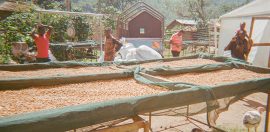How are co-ops responding to the coronavirus?

31 March 2020 at 5:22 pm
We look at how 10 cooperatives across Australia are supporting their communities in the face of an international health crisis.
For many cooperatives and mutuals in Australia, the threat to business is looming.
But Melina Morrison, CEO of Business Council of Co-operatives and Mutuals, says the model has some real advantages compared to corporates: they’re more adaptable, faster to move and able to cut operating costs more easily because they’re not having to answer to distant shareholders.
In the face of COVID-19, co-ops across the country have turned their attention to supporting communities to cope during these difficult times.
Here we look at 10 examples of how Australian-owned cooperatives and mutuals have risen to the challenge.
HCF
HCF has made changes to ensure all HCF Hospital policies for Australian residents are covered for COVID-19, provided at no extra cost.
“For nearly 90 years HCF has been trusted by Australians and their families to safeguard their health and provide support and advice when they’re needed most. In these challenging and uncertain times, our commitment to you hasn’t changed.”
Bank Australia
Bank Australia is offering its customers impacted by COVID-19 a range of assistance. In addition to tailored financial assistance on offer to meet individual circumstances, it is also making several changes to its banking products, including waiving monthly account keeping fees, reducing rates for new fixed rate home loans, and reducing cash linked commercial loan rates for existing commercial customers.
“The personal and financial wellbeing of our customers is our priority as we work through the uncertainty and impacts the COVID-19 pandemic is having on all Australians, small businesses, and the economy as a whole.”
Australian Unity
Australian Unity says its primary focus is the health and wellbeing of the 50,000-plus older Australians and 6,000 workers across its home care services and residential communities.
It has put systems in place to prevent and respond to outbreaks, and employees have been advised on infection control and how to identify early symptoms of COVID-19 infection.
“The wellbeing of our customers and our people is our highest priority in these challenging times and we are doing everything we can to support and care for them.”
Defence Bank
Defence Bank is defined as an essential service and its branches and contact centre will remain open for members and defence partners.
“We will continue to closely monitor and be guided by commonwealth government advice on how to operate during this period with our immediate priorities as always to support the well-being of both our members and employees, and ensure our everyday banking services continue to be delivered.”
Heritage Bank
Heritage Bank has established a COVID-19 Relief Package to assist members facing financial difficulties because of the current challenging circumstances. The package includes deferrals of home loan and business loan repayments for up to six months, deferrals of personal loan or credit card loan repayments, additional working capital and loan restructures to be considered for business banking customers, and a waiver of arrears fees, default fees and dishonour fees for Heritage lending products for the next six months.
“With the COVID-19 situation continuing to evolve in Australia, Heritage Bank has reacted quickly to put in place measures to protect the health of our staff and our members, and to maintain the vital services we provide.”
Greater Bank
Greater Bank has implemented a range of measures to support the financial wellbeing of its members impacted by the pandemic. It is supporting small business customers by reducing current variable rate business loans, offering flexibility to restructure existing lending facilities, and offering a repayment holiday on current business loans. It is also supporting home loan and personal loan customers with flexible repayment options.
“There is no doubt that we are experiencing unprecedented times due to the rapidly evolving COVID-19 pandemic. We understand that a number of our customers have already been impacted and there will be more who will face hardships as the full effects are felt.”
Capricorn Society
Capricorn Society is managing supply chain issues related to automotive repair and maintenance products. The supply chain for replacement parts in Australia is very exposed to China, so Capricorn has been speaking to major suppliers to plan for the coming months.
“Some companies have a good, better, best strategy for a number of product categories. This means the same item is available in different brands, so if one brand becomes depleted they have others to fall back on.”
Oz Group Co-op
Oz Group Co-op’s network of farmers and growers have been working proactively to secure supplies of essential materials such as fruit packing boxes, fertilisers and fungicides.
“We are continually communicating with our suppliers to build up our reserves to have at least six months available on hand, which should carry our growers through the peak season.”
The Limestone Coast Fishermen’s Co-operative
The Limestone Coast Fishermen’s Co-operative sees the COVID-19 outbreak as a good example of how the co-operative business model demands a low-risk approach to running an export business.
“We will continue to work closely with our members, and other industry stakeholders, and we are communicating regularly with the marketplace to provide the best and most timely information about the situation but, for now, we have to wait and see what transpires over the coming days and weeks.”
Geraldton Fishermen’s Co-operative
The primary concern for the Geraldton Fishermen’s Co-operative is labour supply.
“Fifty per cent of the casual work force in our regional hubs are on work visas, so extending visas would be something that we’d put our support behind as well.”








